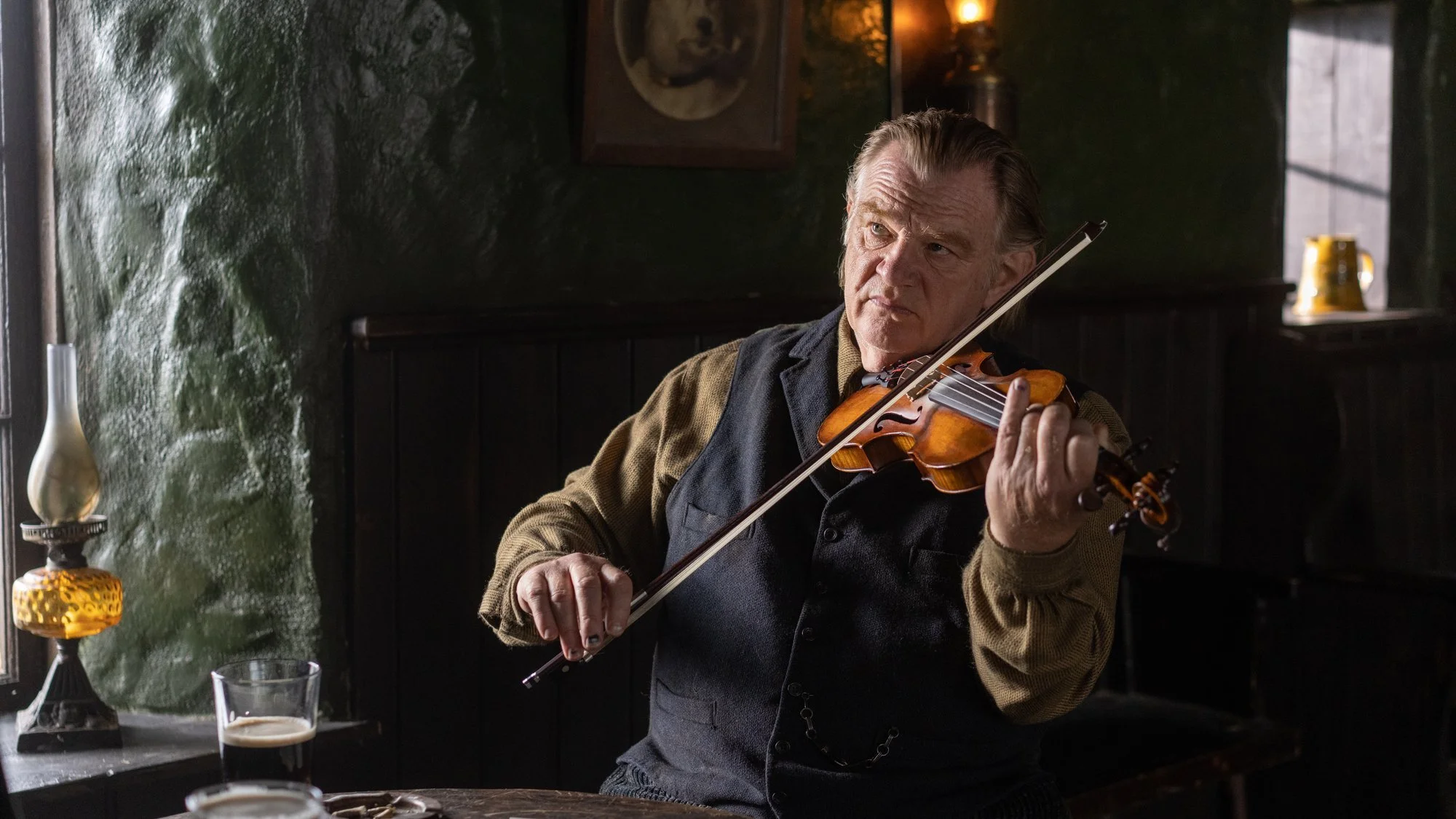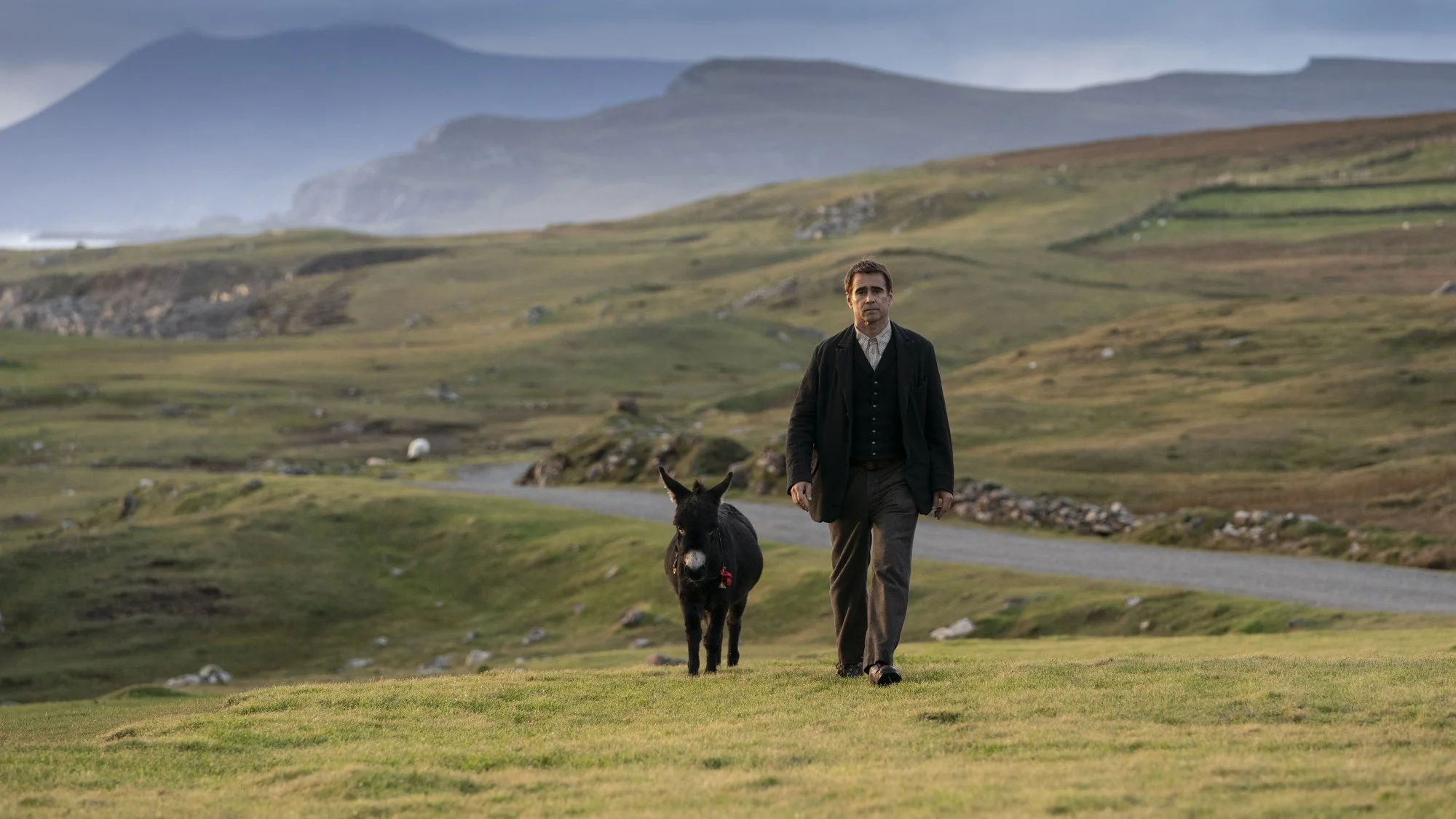The Banshees Of Inisherin
In Bruges odd couple Colin Farrell and Brendan Gleeson reunite (and then uncouple) in Martin McDonagh’s break-up movie of the year, The Banshees of Inisherin. Fights are had, feelings are hurt and fingers are sheared in a tragicomedy that ponders why it’s so much harder to end things with a friend than a lover, and why the pursuit of greatness might not be worth the sacrifice of being nice.
The year is 1923 and Ireland is in the midst of a civil war. Across the sea on the isle of Inisherin, a completely unaffected Pádraic (Farrell) is about to go for his daily pub trip with his best friend Colm (Gleeson). But when he arrives at Colm’s cottage, Colm does not answer the door. Pádraic peers through the window and sees his friend sitting, staring intently in a direction that isn’t his. After several attempts to wake him from what seems to be a trance, Pádraic gives up and goes to tell his sister, Siobhán (Kerry Condon) about Colm’s perplexing snub. “Maybe he just doesn’t like you no more,” she jokes, a sentiment that, unfortunately for Pádraic, Colm will soon echoe verbatim.
At a glance, Banshees is about a fella who simply doesn’t wish to continue his friendship with another fella. And the more we learn about the pair, the more baffling it becomes that they’ve managed to stay friends this long. Pádraic is a simple dairy farmer with little to fill his mind than the contents of his donkey’s droppings, while Colm is a fiddle player plagued with existential despair and a newfound determination to leave behind a musical legacy. With the reminder of life’s fleetingness just off the coast and no time left for dullards, Colm puts in place a very strong boundary to prevent his former friend trying to engage; if Pádraic does not leave him alone, he will cut off one of his own fingers for each interference. Some of us have better willpower than others and for Colm, the risk of ending up with two stumps and a silent fiddle is necessary in not caving to niceness. But Pádraic’s willpower (or stupidity) is stronger still, resulting in a war of Western proportions that begins to rival the one across the sea.
Fiddler in the Booth - Brendan Gleeson as Colm, trying to compose a masterpiece in the pub
Like all who go through the stages of grief, Pádraic spends a frustratingly long time in denial of his dumping; that is, until Colm follows through on his threat of digital amputation and Pádraic finds more fingers than is perhaps socially acceptable thrown at his front door. Like the infighting that rages across the way, Pádraic and Colm’s row becomes so clouded in pettiness and overreactions that audience allegiance swiftly changes throughout the film. Pity for poor, dull Pádraic drives our empathy in the beginning but gives way to exasperation on Colm’s behalf as his memo has clearly not been received. Pádraic’s lack of self-awareness in his poor treatment of town fool Dominic (Barry Keoghan) echoes the dynamic between Colm and himself, while Siobhán’s displays of superior intellect show the cracks in Colm’s pretentious pursuits.
There are similarities in themes and feel between Banshees and Calvary (also starring Gleeson), the third film by the other McDonagh. With a heightened theatrical premise and carefully blended humour to reprieve from all the despair, both films tackle the unreasonable whims of their characters and the depressing nature of life in a beautiful but historically troubled country. Brendan Gleeson meeting someone on a beach again is reason enough for anxiety but at Banshees’ conclusion, it seems that this relationship will not be laid to rest so finitely.
What McDonagh has achieved here might well be his best cinematic effort to date. A classic fable one might read in a dusty old book stained by whiskey and men’s tears, The Banshees of Inisherin confines itself to its locale and characters, yet is universal in its appeal to anyone who’s loved, lost and forgotten what they were ever angry about. The metaphor of the mainland Irish feud echoed in Pádraic and Colm’s small time stoush never becomes too heavy handed and the story feels more personal than historical. Their argument means very little to those outside the pub but everything to the two men, spiralling so out of control that both parties are left in equal despair as the rest of the world moves on around them. The title refers to Colm’s alleged masterpiece that he finishes after some productive time away from Pádraic and perhaps this song is his unconscious admission that Death approaches all (and quickly, for those preoccupied with nonsense).
Who are the eponymous banshees signalling doom for Insherin’s inhabitants? Sheila Flitton’s Mrs. McCormick, heavily serving The Seventh Seal vibes with her dark cloak, scythe-like walking aid and uncanny ability to always be standing alone on a cliff or desolate path, seems an obvious choice. Perhaps it’s Siobhán, tiring herself with attempts to reconcile Pádraic and Colm, gently rebuff Dominic’s affections and keep the farm animals out of the house before exasperatedly screaming “yer all feckin’ BORING,” at her failures on all counts. Or maybe the beautiful, harsh and isolated land of Inisherin, with her crashing waves and shrieking winds, heralds a reminder that nothing lies beyond these shores for her residents - unless they actually nut up and go see for themselves.
A man and his ass - The gorgeous Jenny the donkey and Colin Farrell as Pádraic
It’s a beauty captured in spades by cinematographer Ben Davis (DP on Three Billboards Outside Ebbing, Missouri) and enhanced by Carter Burwell’s mythical score that’s heavy on harp, flute and a foreboding tempo that ticks away at our time on Inisherin. The Bulgarian opening song is one McDonagh sent to Burwell early on in the production and for good reason; its power in setting the stage for the deep sadness to come seems quite dramatic and at odds with daily life on Inisherin, but that’s exactly the point. Colm can dismiss Pádraic for his dullness as Pádraic dismisses Dominic as the real dolt of the isle, but none of them can escape the fact that they might die and quickly become forgotten, without having experienced much of the beauty life has to give.
But it’s not all doom and gloom - Banshees is as successful in eliciting laughs (and there are many) as it is in prodding at hearts with a fine needle. McDonagh’s sharp dialogue is perfectly delivered through his actors’ outstanding performances, resulting in many quotable moments to rival Ralph Fienne’s “inanimate fucking object” outburst. The chemistry between Farrell and Gleeson has only brewed stronger in the years since In Bruges and their relationship (both onscreen and off) is a real strength. Farrell’s eyebrows should get separate credit for the hilarity (and heartbreak) they imbue, while Gleeson’s subtle expressions contain all the wisdom and regret of a man held back by his own life choices. Kerry Condon very nearly steals the show with her stellar work as a woman who has well and truly had enough, and Barry Keoghan devastates as the worst-treated person on Inisherin who still manages some cheer.
The Banshees of Inisherin is one of the best films of 2022 that, like a perplexing fairytale from childhood, buries its hook deep into the back of your mind and refuses to let go. I had the pleasure of pairing my viewing with a whiskey cocktail and a sold out audience of senior citizens - a most poignant cinema experience that I am unlikely to forget any time soon.


